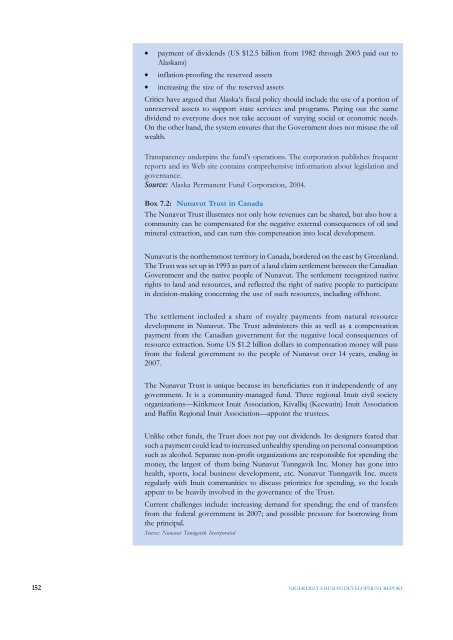Niger Delta Human Development Report - UNDP Nigeria - United ...
Niger Delta Human Development Report - UNDP Nigeria - United ...
Niger Delta Human Development Report - UNDP Nigeria - United ...
You also want an ePaper? Increase the reach of your titles
YUMPU automatically turns print PDFs into web optimized ePapers that Google loves.
• payment of dividends (US $12.5 billion from 1982 through 2003 paid out to<br />
Alaskans)<br />
• inflation-proofing the reserved assets<br />
• increasing the size of the reserved assets<br />
Critics have argued that Alaska‘s fiscal policy should include the use of a portion of<br />
unreserved assets to support state services and programs. Paying out the same<br />
dividend to everyone does not take account of varying social or economic needs.<br />
On the other hand, the system ensures that the Government does not misuse the oil<br />
wealth.<br />
Transparency underpins the fund’s operations. The corporation publishes frequent<br />
reports and its Web site contains comprehensive information about legislation and<br />
governance.<br />
Source: Alaska Permanent Fund Corporation, 2004.<br />
Box 7.2: Nunavut Trust in Canada<br />
The Nunavut Trust illustrates not only how revenues can be shared, but also how a<br />
community can be compensated for the negative external consequences of oil and<br />
mineral extraction, and can turn this compensation into local development.<br />
Nunavut is the northernmost territory in Canada, bordered on the east by Greenland.<br />
The Trust was set up in 1993 as part of a land claim settlement between the Canadian<br />
Government and the native people of Nunavut. The settlement recognized native<br />
rights to land and resources, and reflected the right of native people to participate<br />
in decision-making concerning the use of such resources, including offshore.<br />
The settlement included a share of royalty payments from natural resource<br />
development in Nunavut. The Trust administers this as well as a compensation<br />
payment from the Canadian government for the negative local consequences of<br />
resource extraction. Some US $1.2 billion dollars in compensation money will pass<br />
from the federal government to the people of Nunavut over 14 years, ending in<br />
2007.<br />
The Nunavut Trust is unique because its beneficiaries run it independently of any<br />
government. It is a community-managed fund. Three regional Inuit civil society<br />
organizations—Kitikmeot Inuit Association, Kivalliq (Keewatin) Inuit Association<br />
and Baffin Regional Inuit Association—appoint the trustees.<br />
Unlike other funds, the Trust does not pay out dividends. Its designers feared that<br />
such a payment could lead to increased unhealthy spending on personal consumption<br />
such as alcohol. Separate non-profit organizations are responsible for spending the<br />
money, the largest of them being Nunavut Tunngavik Inc. Money has gone into<br />
health, sports, local business development, etc. Nunavut Tunngavik Inc. meets<br />
regularly with Inuit communities to discuss priorities for spending, so the locals<br />
appear to be heavily involved in the governance of the Trust.<br />
Current challenges include: increasing demand for spending; the end of transfers<br />
from the federal government in 2007; and possible pressure for borrowing from<br />
the principal.<br />
Source: Nunavut Tunngavik Incorporated<br />
152 NIGER DELTA HUMAN DEVELOPMENT REPORT










